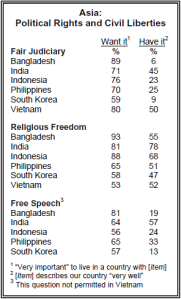
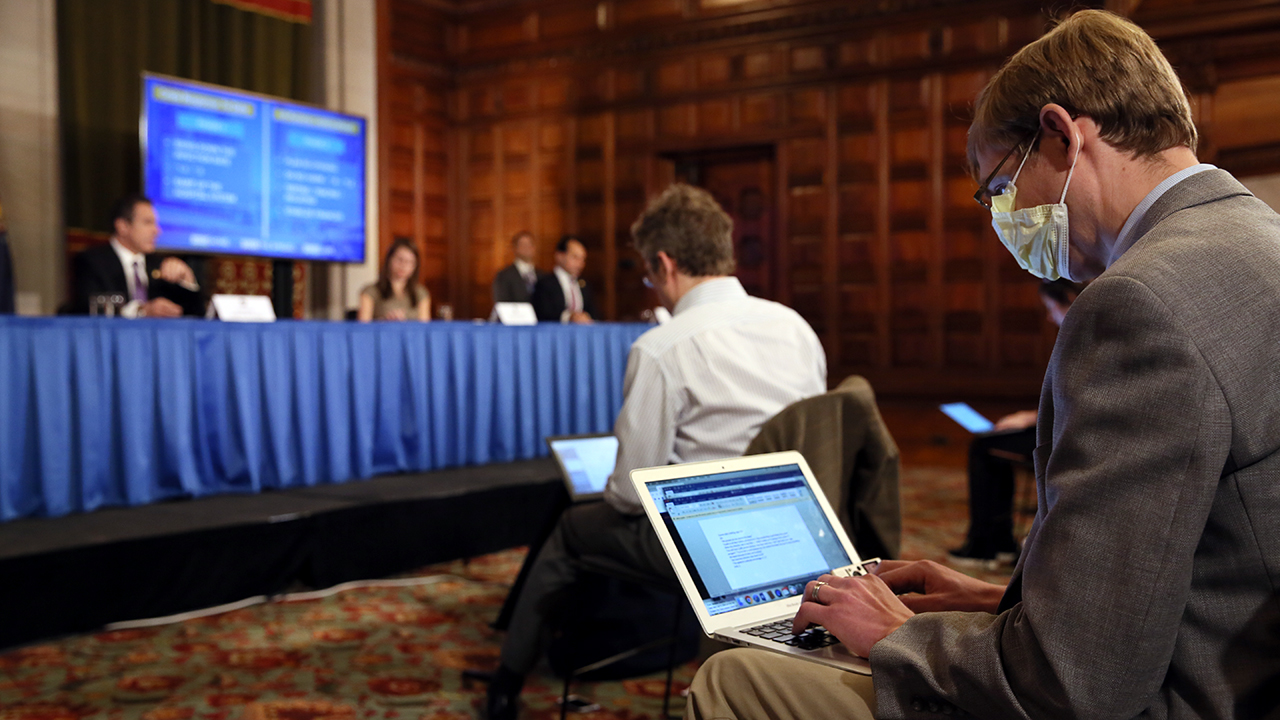
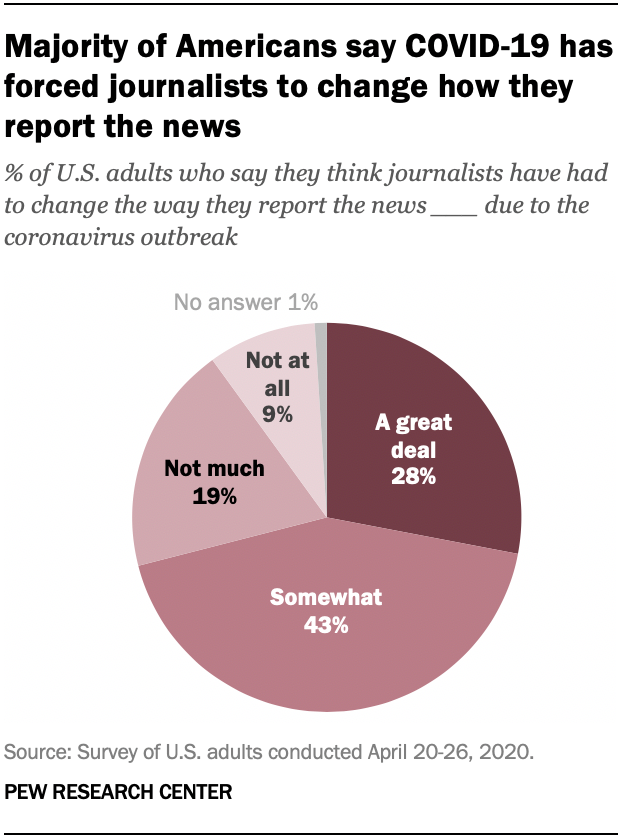
A solid majority of Americans say the COVID-19 pandemic has changed the way journalists report the news, but they are far less certain about how the outbreak is affecting news organizations’ bottom lines, according to an April 20-26 survey conducted among 10,139 U.S. adults as part of Pew Research Center’s Election News Pathways project.
About seven-in-ten U.S. adults (71%) say that as a result of the pandemic, journalists have had to change the way they report – either somewhat or a great deal. A total of 28% say journalists have not had to change how they report much or at all.
How we did this
To gauge how the American public perceives the state of the news industry during a time it has struggled during the COVID-19 outbreak, we surveyed 10,139 U.S. adults between April 20-26, 2020. Everyone who took part is a member of Pew Research Center’s American Trends Panel (ATP), an online survey panel that is recruited through national, random sampling of residential addresses. This way nearly all U.S. adults have a chance of selection. The survey is weighted to be representative of the U.S. adult population by gender, race, ethnicity, partisan affiliation, education and other categories. Read more about the ATP’s methodology.
Here are the questions used for this report, along with responses, and its methodology.
These measures and more can be explored further in the Election News Pathways data tool, where all of the data associated with this project is available for public use.
On both questions there are differences by political affiliation and ideology. Democrats and those who lean to the Democratic Party are more likely than Republicans and Republican leaners to say that COVID-19 has changed how journalists report the news. They are also more likely than Republicans to believe that the outbreak has done financial harm to most news organizations.
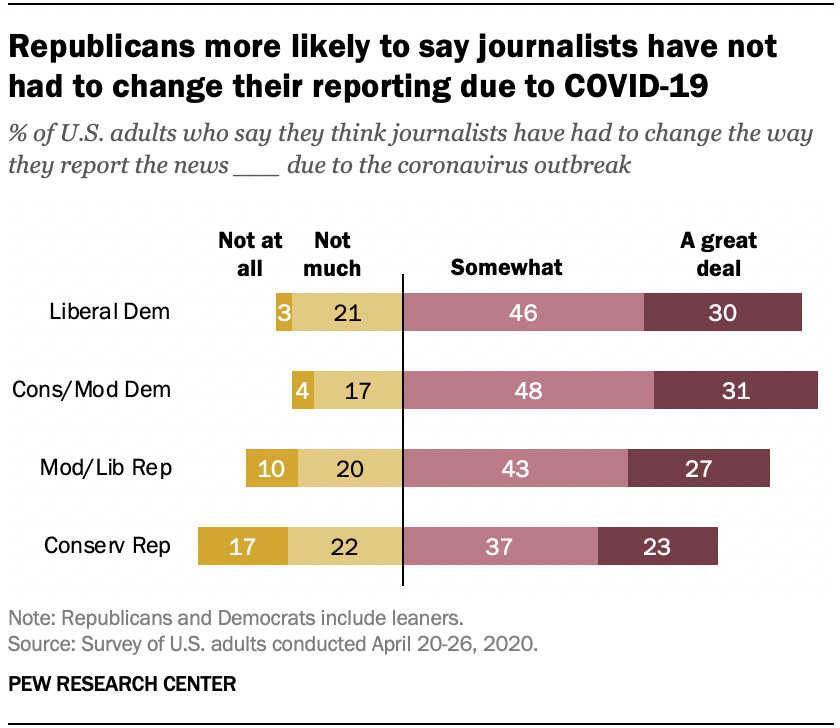
In all, 77% of Democrats and Democratic leaners say COVID-19 has changed the way journalists report the news, either somewhat or a great deal. That share decreases to 64% among Republicans and GOP leaners.
This pattern holds when examining the ideological segments within each party. Among conservative Republicans, for example, 60% say journalists have had to change how they report as a result of the COVID-19 outbreak. That compares with 78% of conservative and moderate Democrats and 76% of liberal Democrats who say the outbreak has spawned changes in reporting.
The question about the financial impact of the outbreak comes against a backdrop of cutbacks in an already beleaguered industry hit by additional advertising declines as COVID-19 shutters U.S. businesses. And, in a rare show of bipartisanship, more than 70 U.S. senators have asked the Office of Management and Budget to boost local news outlets with federal advertising dollars.
Still, the results of a 2019 Pew Research Center report indicate that most Americans are unaware of the economic travails of the local news industry and that few contribute money to local news organizations themselves.
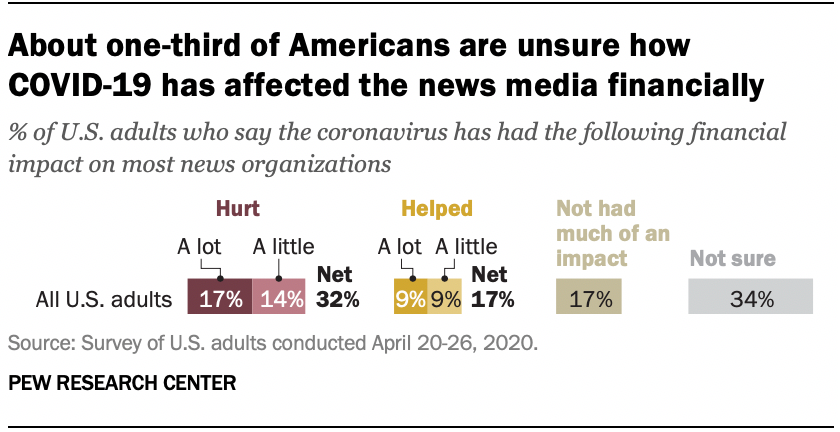
In the new survey, uncertainty about COVID-19’s impact on most news organizations’ finances is one area that crosses partisan and ideological lines. About one-third of all Democrats (34%) and Republicans (32%), including liberal Democrats (37%) and conservative Republicans (34%), say they are not sure of the impact.
Republicans (21%) are somewhat more likely than Democrats (15%) to say that the pandemic has financially helped news organizations a little or a lot. The same pattern appears in the shares who say it has not had much economic impact (21% of Republicans say no impact vs. 15% of Democrats).
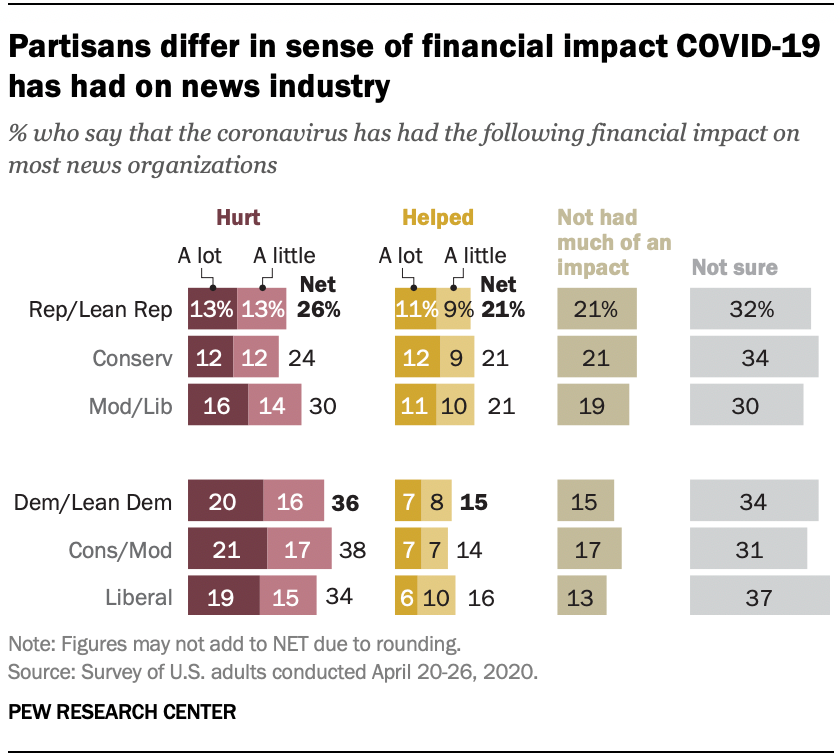
The most significant partisan divergence is among those who say that the outbreak has hurt news organizations financially, either a little or a lot. Slightly more than a third (36%) of Democrats say those organizations have been adversely affected, compared with 26% of Republicans.
In the ideological segments of each party, 24% of conservative Republicans say the pandemic has done either a lot or a little bit of economic damage. That percentage increases to 30% among liberal and moderate Republicans, to 34% among liberal Democrats, and to 38% among conservative and moderate Democrats.
Aside from partisan differences, another factor that seems to affect responses to the questions about COVID-19’s impact on journalism is how closely people are following news about the outbreak.
For example, about seven-in-ten of those who say they are following news about the outbreak very closely (72%) or fairly closely (73%) say COVID-19 has changed how journalists report the news, either somewhat or by a great deal. That number decreases to 60% among those following that news not too closely or it not at all closely.
Similar differences emerge on the question of the pandemic’s financial impact on the news industry – particularly among those who say it has hurt news organizations economically.
More than a third (36%) of those following news of the pandemic very closely say it has done harm to the news industry’s bottom line, either by a little or a lot, followed by 29% of those who follow that news fairly closely. A quarter of those who say they follow COVID-19 news not too or not at all closely say the virus has financially hurt most news organizations.
Note: Here are the questions used for this report, along with responses, and its methodology. These findings are a part of Pew Research Center’s yearlong Election News Pathways project. You can find all the data from this report in the Pathways data tool, analyze it alongside other data points and even download the entire dataset.